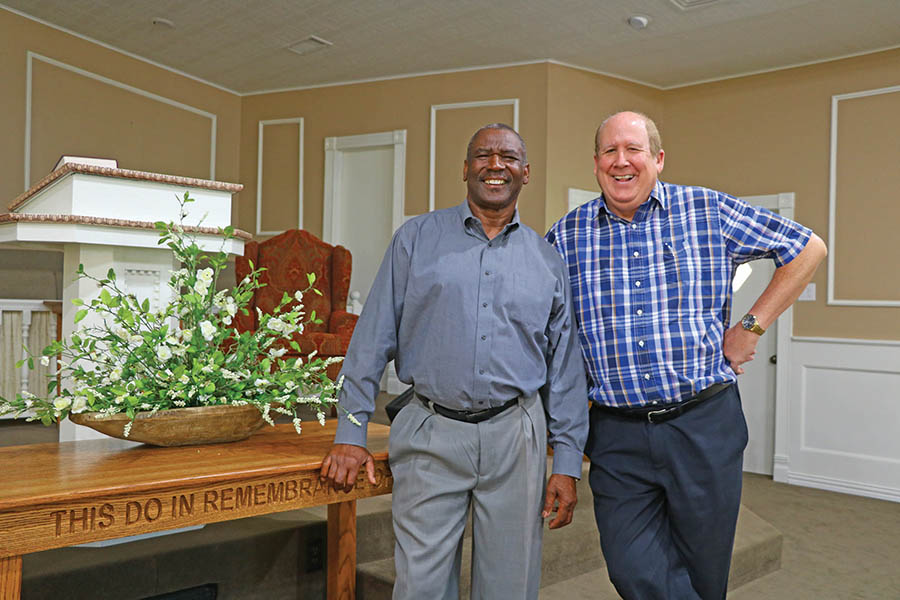
STOWELL, Texas (BP) — Sammy Little looked down at the checklist in his hand. One empty box on the spiritual goals inventory he and thousands of men gathered at the 1995 Promise Keepers conference had been asked to take glared back at him.
 “One of them was race related,” said Little, pastor of First Baptist Church of Stowell in southeast Texas. The rural town is just south of Vidor and Jasper, communities with tense racial histories.
“One of them was race related,” said Little, pastor of First Baptist Church of Stowell in southeast Texas. The rural town is just south of Vidor and Jasper, communities with tense racial histories.
The list in Little’s hand required that the white pastor honestly assess whether he counted anyone of another race among his close friends.
“And I had to be honest,” Little told the TEXAN. “I mean, I don’t want to be prejudiced but I really don’t know anybody. I’m friendly with a couple of people but we really don’t know each other. So I thought, ‘Well, I gotta get a black friend.’ So, I went and asked Mack.”
Mack Bronson managed the meat market in the local grocery store in 1995. Little was among his many white acquaintances. But Bronson, who is black, was also well acquainted with racism.
Growing up in 1950s- and ’60s-era Jasper, bigotry’s hateful expressions toward him — compounded by his father’s untimely death in a work-related accident — left him angry.
A strong work ethic earned him favor and promotions with white store managers. But he admitted good business sense, not a compassionate heart, animated his congenial relationship with white customers.
That is until Little approached him at work with a proposition.
“Sam came to my job and told me, ‘I need a black friend,'” Bronson recalled.
“That’s what he did. I’m serious,” Bronson said. “And I told him that, ‘Well, I can qualify because I’m black.'”
And he accepted the invitation.
Bronson, 72, and Little, 62, recounted the story of their enduring friendship from a conference room at First Baptist Church Stowell.
The men quibbled like old friends over the details of what happened next. But 24 years removed from that moment, they agreed God had a hand in bringing — and keeping — them together.
Depending on whose recollection is correct, the men met that afternoon or the next day at the new McDonald’s restaurant in neighboring Winnie.
There they shared stories about growing up and discovered they were “as different as daylight and dark,” Bronson said.
Their differences required working through disagreements instead of abandoning the relationship. That commitment testified to their respective — and racially divided — communities about the Gospel’s power of reconciliation.
And their friendship introduced them to people and circles of influence they would not have had without each other.
Better together
When he wasn’t managing the meat market, Bronson ministered to young gang members in the rural community. Armed with the Gospel and little else, Bronson turned to Little and his mostly white congregation for help.
“If you had a basketball and a gym at that particular time [1996], you could be like a pied piper,” Bronson said.
So Little offered his church gym. And Bronson offered a Bible study and pick-up basketball for the town’s black gang members.
By 1998, that outreach effort turned into a church plant in Beaumont.
Little encouraged Bronson to follow God’s call to start and lead what would become a predominantly black congregation. The members lived on the fringes of their communities. They were poor. They were ex-cons. And they committed their lives to Christ, Bronson said.
Bronson recently retired as its pastor. The two churches have maintained a relationship with the Stowell church offering aid through the years. In March, Little and members of his congregation joined the Beaumont church in celebrating its 20th anniversary.
Influence outside the church
When the two attend church networking meetings, Bronson is often the only black man or Little is the only white man. It doesn’t feel awkward anymore, they said. But it doesn’t feel right either.
“Everyone realizes we should have more blacks here,” said Little about the Southern Baptists of Texas Convention and other church networks his church cooperates with.
He acknowledged ongoing efforts to draw more minority pastors into the networks, but the relationships seem short-lived, he said. And while attempts to bridge the racial divide on a church-to-church basis may falter, their one-on-one relationship has opened interracial ministry opportunities for both men.
Bronson preached at FBC Stowell while Little traveled in Israel. And with introductions made by Bronson, Little aided in the recovery efforts of a small African American church following Hurricane Harvey. It’s work Little would not have been a part of had it not been for his friendship with Bronson.
With the reconstruction completed, Little and Bronson attended the church’s rededication services.
“They had all these black pastors and me. It was great!” Little said.
More than a moral checklist
In retrospect, Bronson and Little recognize they each filled a void in the other’s life and in their respective ministries. Their relationship has testified to the Gospel’s redeeming work in a region where people still exist along a racial divide.
Pastors should set the standard for recognizing the lack of interracial friendships and in acknowledging the sinful prejudices that inhibit those friendships, Little said.
“Sam said he was prejudiced,” Bronson said. “Sam did something about it. He had a choice. He wanted to be obedient to the Lord. Same with myself.”
















